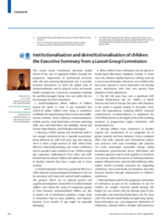Displaying 181 - 190 of 771
In this commentary piece, Anne Longfield, Children’s Commissioner for England, explores the use of children's care homes in England and the need for improved supports to prevent placement in children's home and to provide for the needs of children and young people who are placed in these homes.
This Lancet Group Commission, published between The Lancet Child & Adolescent Health and The Lancet Psychiatry, advocates global reform of the care of separated children through the progressive replacement of institutional provision with safe and nurturing family-based care.
In this commentary piece, Aisha K Yousafzai - of the Department of Global Health and Population at the Harvard TH Chan School of Public Health and the and Department of Paediatrics and Child Health at Aga Khan University - notes that "the evidence presented [in the Lancet Group Commission on the institutionalisation and deinstitutionalisation of children] and their call to action to ensure abandoned children can thrive in family-based care environments rather than in institutions matters now more than ever as the global community addresses unprecedented challenges to ensure a generation of children are not left behind with respect to their survival, health, development, learning, and safety."
This Executive Summary provides an overview of the Lancet Group Commission, which advocates global reform of the care of separated children through the progressive replacement of institutional provision with safe and nurturing family-based care.
This paper reviews the literature on child institutionalisation and deinstitutionalisation from a global perspective. This review included a survey of historical and cultural trends and estimates of current numbers of children in institutional care, a systematic review and meta-analysis of developmental sequelae, and a largely qualitative review of factors found to predict individual variations in such outcomes.
In this commentary piece for The Lancet Psychiatry, Joan Kaufman highlights some key findings and recommendations from the Lancet Group Commission on the institutionalisation and deinstitutionalisation of children.
The aim of the present study was to provide understanding into the past and present experiences of individuals who had resided in a child-care institution during their childhood and/or adolescence and to contribute to the study of the long-term impact of institutional care on adult life.
The first aim of this study was to examine differences in the socio-emotional functioning of adopted and institution-reared children in Chile. The second aim of this study was to examine the influence of adoption related variables on the psychological adjustment of adopted children.
Using 20-year follow-up data from a unique natural experiment – the large scale adoption of children exposed to extreme deprivation in Romanian institutions in the 1980s – the authors of this paper examined, for the first time, whether such deficits are still present in adulthood and whether they are associated with deprivation-related symptoms of attention-deficit/hyperactivity disorder (ADHD) and autism spectrum disorder (ASD).
In this study, the authors examined (a) whether institutional rearing is associated with continued social communication (SC) deficits into adolescence; (b) whether early placement into foster care mitigates risk for SC problems; and (c) associations between SC and psychopathology from middle childhood (age 8) to adolescence (age 16).


